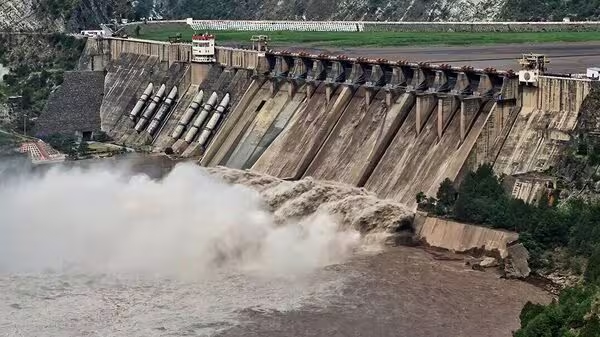Tensions between Pakistan and India have escalated again — this time over water. India has blocked the flow of water from the Baglihar Dam on the Chenab River. It is also reportedly planning to restrict water from the Kishanganga Dam on the Jhelum River. Both dams give India control over the timing and release of river water, a power it now seems willing to use amid growing hostilities.
Sources quoted by the Press Trust of India revealed that India’s move is in response to the April 22 attack in Pahalgam, Indian Illegally Occupied Jammu and Kashmir, which left 26 people dead, most of them tourists. Without providing evidence, New Delhi blamed Islamabad for the incident.
India’s decision to interfere with river flow challenges the decades-old Indus Waters Treaty. Brokered by the World Bank in 1960, the Indus Waters Treaty governs the shared use of the Indus River and its tributaries between the two countries.
Pakistan has strongly condemned India’s move to suspend the Indus Waters Treaty. It has warned that halting water flow will be considered an “act of war.” Islamabad also highlighted past violations, accusing India of building at least three dams in breach of the treaty.
The Baglihar Dam in Jammu and the Kishanganga Dam in north Kashmir have long remained contentious. Pakistan earlier approached the World Bank to mediate over Baglihar. The Kishanganga Dam, impacting the Neelum River — a tributary of the Jhelum — has also drawn criticism over its effects downstream.
After India’s decision, Pakistan reacted by expelling Indian diplomats and cancelling visas, except for Sikh pilgrims. The Wagah-Attari border crossing has been shut from both sides. Airspace for Indian flights is now closed. Trade ties, including indirect routes, are completely suspended.
Defence Minister Khawaja Asif issued a sharp warning. He stated that any further Indian construction on the Indus River that violates the Indus Waters Treaty will provoke a direct military response from Pakistan.
Meanwhile, Indian Prime Minister Narendra Modi has given full operational freedom to his military. Top Indian commanders have been told they can decide the mode, timing, and targets of India’s reply. At the same time, Indian media and officials continue to push aggressive narratives.
Despite the threats, Pakistan has shown restraint. It has denied any involvement in the Pahalgam attack and called for an impartial international investigation.
The Indus Waters Treaty, once a symbol of cooperation, now sits at the centre of a rapidly intensifying regional crisis.


